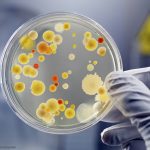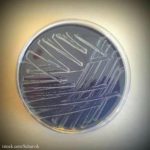The FDA is heralding a drop in antibiotic use in farm animals from 2016 to 2017. This issue is critical to human health, since antibiotic-resistant bacteria are being identified in more and more human food poisoning outbreaks. The World Health Organization warned the medical community about this problem in 2012. At that time, Dr. Margaret Chan said that "antibiotic resistance could end modern medicine as we know it." And that body issued its first report on antibiotic resistance earlier this year, which showed that this is a serious situation worldwide. In 2015, the CDC released a report that stated antibiotic resistant bacteria sicken 2,000,000 Americans every year. At least 23,000 of those patients die. Medically important antibiotics have been used for decades in farm animals … [Read more...]
Columbus State University Students Publish Breakthrough Study on Treating Antibiotic Resistant Bacteria
Columbus State University Biology Majors have published a paper about their research on treating antibiotic resistant bacteria. The students were focusing on alternative therapies to treat Acinetobacter haumannii, which causes urinary tract infections, pneumonia, burns and wound infections, and septicemia. The World Health Organization has said that antibiotic resistant bacteria is a major public health concern and may cause millions of deaths in the future because of untreatable common infections. And in 2016, the CDC found that antibiotic resistant Salmonella causes more than 6,000 illnesses in this country every year. Those types of infections are linked to beef, dairy, poultry, produce, and eggs. The paper, titled "The Effects of Antimicrobial Peptides WAM-1 and LL-37 on … [Read more...]
First Decline in Antibiotic Sales for Livestock in 2016
According to U.S. PIRG, for the first time, antibiotic sales for livestock declined for the first time in 2016. This is something many advocates have been working on for decades, since misuse of antibiotics can and has created antibiotic resistant bacteria. WHO sounded the alarm over this issue in 2014, stating that unless something was done about this issue, the world may enter a new phase in which antibiotics become ineffective for even the smallest infection. At that time, they said, "A post-antibiotic era—in which common infections and minor injuries can kill—far from being an apocalyptic fantasy, is instead a very real possibility for the 21st century." Most of the antibiotics sold in the U.S. and around the world are used in food animals. This downtick comes after "numerous … [Read more...]
WHO Recommends Farmers Stop Using Antibiotics to Promote Growth, Prevent Disease
The World Health Organization issued a news release on November 7, 2017, recommending that farmers and the food industry stop using antibiotics routinely to promote growth and prevent disease in healthy animals to help control the development of antibiotic resistance. Antibiotics that are important for human medicine are used in food animals. The effectiveness of antibiotics is reduced when used on farms. In some countries, "approximately 80% of total consumption of medically important antibiotics is in the animal sector, largely for growth promotion in healthy animals," according to the news release. WHO has been campaigning for these actions to help combat antibiotic resistance for years, and has warned that we are close to an age when antibiotics may become ineffective against … [Read more...]
CDC Investing Millions in Enhanced Antibiotic Resistance Testing
The Centers for Disease Control and Prevention (CDC) is investing $77 million in efforts to track and fight antibiotic resistance. The money is going to public health departments in all 50 states and Puerto Rico. The hope is that officials will develop new ways to combat antibiotic resistant bacteria in food, healthcare facilities, and communities. The funding will open a new surveillance center for TB. And the overall focus is on enhancing testing capabilities in the agency's regional antibiotic resistance labs. Seven regional labs that are part of the CDC's Antibiotic Resistance Lab Network will be able to expand antibiotic susceptibility testing for Candida auras. This bacteria has shown resistance to all three classes of drugs that are usually used to fight these infections. … [Read more...]
Researchers Find One Mechanism for Antibiotic Resistance
A study conducted at Harvard and MIT and published in the journal eLife has discovered one way that bacteria become resistant to drugs. Individual mutations that increase pathogenic bacteria's resistance to multiple antibiotics has not been fully explored. About 23,000 Americans die every year from bacterial and fungal infections that are resistant to antibiotics. That number is expected to increase to 10,000,000 by the year 2050 if new, effective antibiotics are not developed. Scientist cultured the bacteria Mycobacterium smegmatis, a cousin of the bacteria that causes tuberculosis. The scientists grew the bacteria until they formed colonies, and then exposed the colonies to low doses of antibiotics that killed the bacteria slowly. Mutant colonies arose after that … [Read more...]
WHO Publishes List of Bacteria That Need New Antibiotics
The World Health Organization (WHO) has published its first ever list of antibiotic-resistant bacteria that pose the greatest threat to human health and which urgently need new types of antibiotics. These bacteria are resistant to some last-resort antibiotics. According to the Centers for Disease Control and Prevention (CDC), antibiotic-resistant bacteria kill 23,000 Americans every year. And antibiotic resistant bacteria are present in every country on earth. The list highlights gram-negative bacteria that are resistant to multiple antibiotics. These pathogens are constantly evolving to resist new drugs, and they can pass genetic material to other bacteria so they can become drug resistant too. Dr. Marie-Paule Kieny, WHO's Assistant Director-General for Health Systems and … [Read more...]
CDC Tracks Antibiotic Resistance Gene in Bacteria
The Centers for Disease Control and Prevention (CDC) is tracking the mcr-1 gene in bacteria. This gene can make bacteria resistant to colistin, an antibiotic that is the "last resort" drug for some multidrug-resistant pathogens. Colistin is considered an old drug and is rarely used because it can damage the kidneys. The gene was found in China for the first time in November 2015. The map shows where the mcr-1 gene has been reported in the United States as of January 1, 2017. In the states highlighted in yellow, human infections have been reported. The states highlighted in orange have animal infections. The mcr-1 gene is on a plasmid, which is a piece of DNA that can move from one pathogen to another. Because of the ease of this transfer, bacteria that area already resistant to … [Read more...]
Scientists Kill Antibiotic Resistant Bacteria with Brute Force
New research at University College London (UCL) has found that antibiotics can kill antibiotic-resistant bacteria with brute force. The study was published in Nature Scientific Reports. In order to kill bacteria, antibiotics have to bind to the cells in the pathogens. Bacterial resistance can be caused by molecular changes to the surface of the bacteria. Dr. Joseph Ndieyira of UCL Medicine said, "Antibiotics have 'keys' that fit 'locks' on bacterial cell surfaces, allowing them to latch on. When a bacterium becomes resistant to a drug, it effectively changes the locks so the key won't fit any more. Incredibly, we found that certain antibiotics can still 'force' the lock, allowing them to bind to and kill resistant bacteria because they are able to push hard enough. In fact, some … [Read more...]
OSU Scientists Make Progress in Antibiotic Resistant Bacteria War
Scientists at Oregon State University have made progress in the war against antibiotic resistant bacteria. More and more pathogenic bacteria are developing resistance against antibiotics, even our last-ditch drugs. Researchers have found that a molecule can neutralize bacteria's ability to become resistant to antibiotics. The study was published in the Journal of Antimicrobial Chemotherapy. This study is very important, since in September 2016, a woman in Nevada died from a bacterial infection that resisted every type of antibiotic we have in our arsenal. The death was reported by the Centers for Disease Control and Prevention last week. Scientists think that antibiotic-resistant bacteria will kill 10 million people by 2050. The molecule that the scientists at OSU constructed is … [Read more...]









